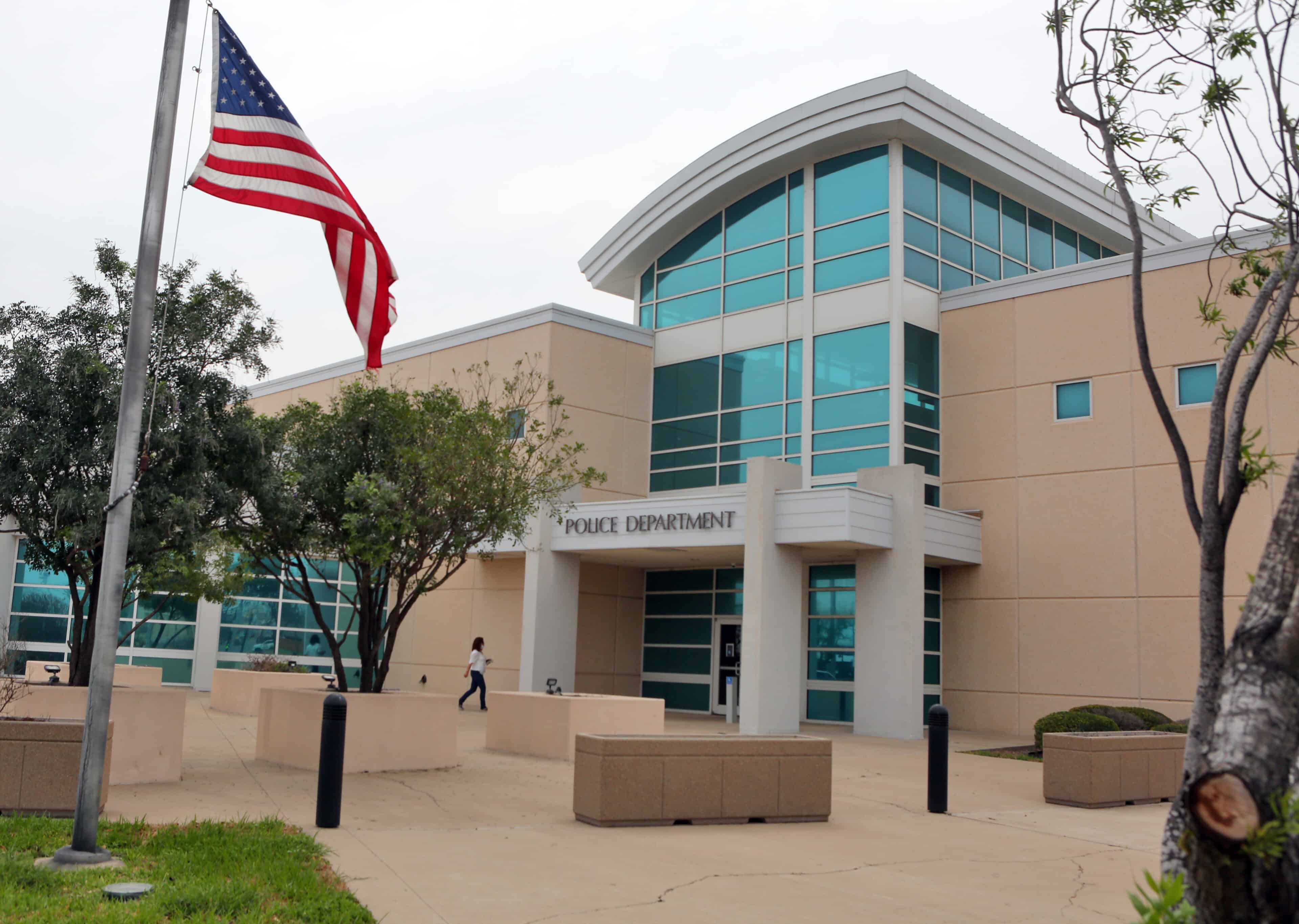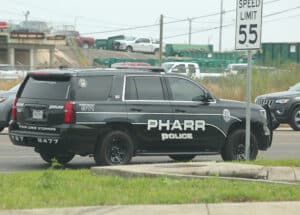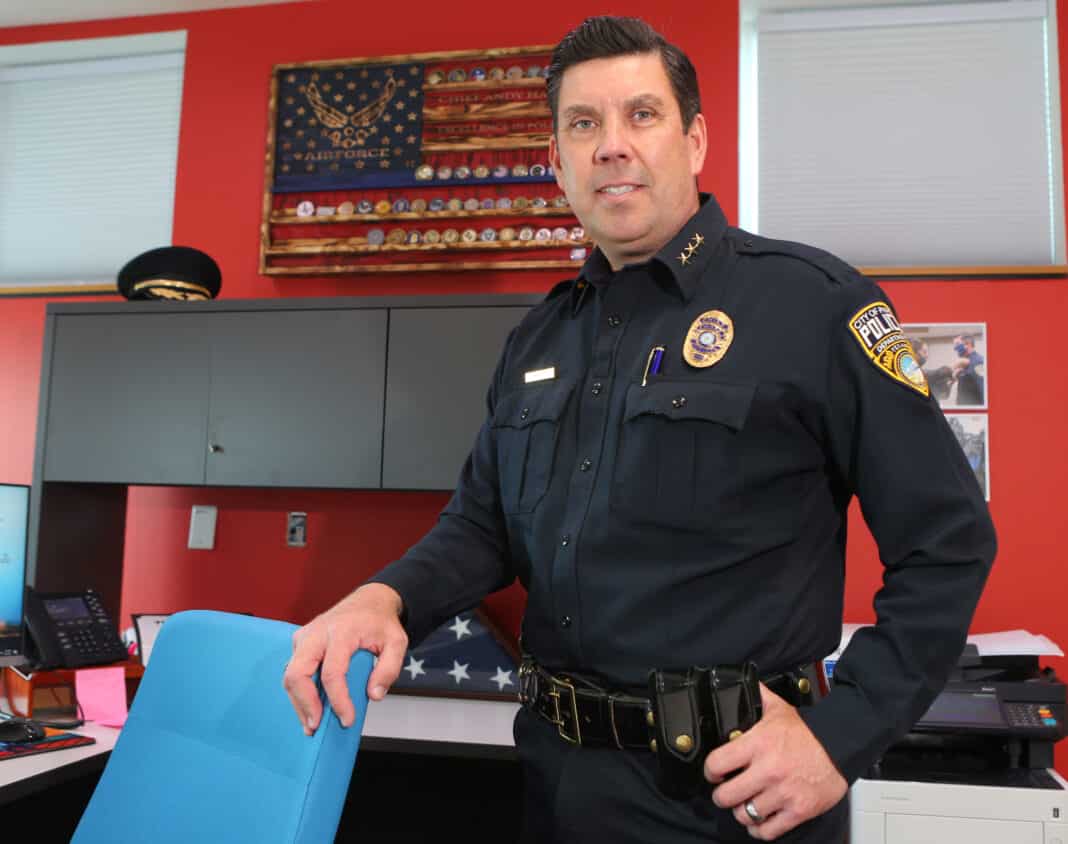PHARR — It has been just over eight months since Andy Harvey took over the role of chief of police in Pharr, and his presence has had a resounding impact on the community in his first year of service to the city.
Harvey was confirmed at the recommendation of interim City Manager Ed Wylie during a special meeting of the city commission on July 13, 2020.
“Our future is bright,” Harvey said after being confirmed and introduced at the meeting. “I’m not a ‘live in the past’ guy. We are future focused, and we’ll only tolerate the present, but we’re going in another direction. We’re going towards the future. That’s the only way for all of us to go.”
In the eight months since Harvey took over, he has moved his department in that direction with a number of policy changes aimed toward building trust within the community, leading the police force to be among the more progressive in the Rio Grande Valley.
“I really love to affect positive change,” Harvey said from his office Monday afternoon.
Originally from Harlingen, Harvey has spent most of his career working with police departments outside of the Valley, including a 21-year stint with the Dallas Police Department. When he was hired, he became the first Pharr police chief to come from an outside department in 50 years.
He said that bringing in a fresh set of eyes was something that is helping to move the department toward the future of policing.
The cite-and-release policy, which was announced on Nov. 18, 2020, was one of the first new measures implemented since Harvey took the reins.
This policy allows Pharr police the discretion to release residents who are found to have less than 2 ounces of marijuana as opposed to taking them to jail.
Harvey explained that cite-and-release does not decriminalize marijuana use; however, it does create a “more dignified” way of processing the low-level crime.
“It does make us more efficient because we have less time that we’re booking someone in jail, and we have to watch them. A lot of them have medical problems and we have to take them to get checked,” Harvey said. “It keeps officers on the street — that’s always important. But I think more so than that, it’s a philosophy of how we want to police in a more dignified and respectful manner when we can.”
Another new idea that Harvey brought to his department was the Mental Health Unit. In December 2020, Harvey brought in Ernie Stevens, an officer with the San Antonio Police Department who is featured in the 2020 HBO documentary, “Ernie & Joe: Crisis Cops.”
With Tropical Texas Behavioral Health, this new unit underwent training to better understand mental illness and appropriately prepare when responding to situations involving individuals experiencing mental health crises.

The department’s Mental Health Unit was put to the test on Feb. 16 when a man barricaded himself inside his home in the 900 block of East Lucas Avenue, resulting in a nearly three-hour standoff. The unit responded to the scene and negotiated with the man, who at times fired a rifle from inside the home, according to police.
When the incident was finally resolved, Harvey expressed concern about getting the man proper assistance.
“We’re really focusing on getting him the help first and then we’ll see if there’s going to be any charges filed. But right now, we’re really more interested in getting him the right help that he needs,” Harvey said after the incident.
More recently, the Pharr Police Department introduced its new Domestic Violence Crisis Response Unit. Along with the Hidalgo County District Attorney’s Office, the unit was created to support victims of domestic violence.
Asked how his department is measuring the success of the cite-and-release policy and new units, Harvey didn’t note any tangible gauges, but did point to whether the relationship between the public and the police is a healthy one.
He said that the true purpose of these units and policies is to help create more trust in his department, which ultimately results in greater efficiency by police.
“When you have more trust in your police department, then more so than not we’re going to get more compliance from people and cooperation from the citizenry when we need their help,” Harvey said. “That makes us all safer at the end of the day. Can we measure (success) accurately? No, because there are a lot of intangibles. But I do believe it makes us safer, and I think that’s really the overall goal for everything that we do.”
His efforts go toward the goal of “lifting up the city” by setting a positive example. Toward that end, he announced the creation of a mounted police unit, which will graduate its first group of officers next week, as well as plans for a motorcycle unit for his department.

“We’re here. We’re not just you call 9-1-1 and we just show up,” Harvey said. “No, we want to be here. We want to have a presence in this city — a positive presence with not only events but just being at places, just being there and meeting people where they are.
“I think that’s part of the mental health and domestic violence (units). It’s meeting people where they are in order to get the help that they need.”
Considering the influence a police force has in communities, he said it’s up to police to be community leaders, especially when it comes to injustices.
“The reason I say ‘lifting up the city’ is because I believe two things: that a police department can lift up a city or it can tear it down,” Harvey said. “Think of the influence that a police department has over a community and how we police. That’s why I’m a firm believer of us doing things intentionally in order to help the city and hopefully this region. I know the Valley — I’m from here. Sometimes they say, ‘I’ve heard that the Valley is behind the times.’ Well, it’s time to get rid of that. It’s time to be forward thinking.”
With his new policies making headlines throughout the region, Harvey said that much of the feedback he has received has been mostly positive, and seeks to start a conversation about issues that many may find difficult addressing.
“At least it got the conversation going where it challenges us to think differently,” Harvey said. “I think that’s what we need down here, to think differently about how we police and what we say in public. I think we’ve been very fearful policing, or hesitant, to just be quiet and kind of let things go however they go. We can’t do that anymore in today’s world. We have to be at the forefront of speaking out when there’s injustice. If it’s wrong, we’ve got to speak out.”
The Pharr police chief took particular issue with George Floyd’s death, which sparked Black Lives Matter protests throughout the country and locally in the Valley.
For Harvey, it’s important that police departments listen to their communities and participate in conversations about such injustices.
“Just look at what happened to George Floyd. I think it’s in our best interest to speak out and say, ‘That was wrong,’ instead of just laying back and letting you guys and the public chime in,” he said. “We have an opinion too, and we don’t like that either. I think it’s important for people to know that, but again, if you’re not relevant, then people aren’t listening.”
Many of Harvey’s theories about policing and building trust within the community can be found in a book he wrote when he was chief of police in Palestine, Texas called, “Excellence in Policing; Simple Ways to Exceed Citizen Expectations in Every Encounter.”
“Everything we do is to build trust and confidence in the police department,” Harvey said. “Everything.”





